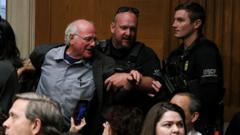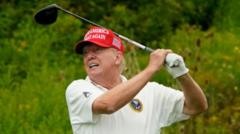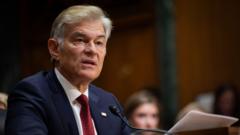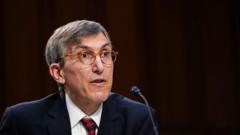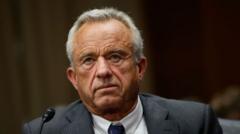The recent decision by the US Department of Health and Human Services to cancel $500 million in funding for mRNA vaccine projects has raised eyebrows. This decision affects 22 ongoing initiatives targeted at combating various viruses, including Covid-19 and bird flu, with significant involvement from major pharmaceutical firms like Pfizer and Moderna.
RFK Jr's Cancellation of mRNA Vaccine Funding Sparks Controversy

RFK Jr's Cancellation of mRNA Vaccine Funding Sparks Controversy
In a bold move, Health Secretary RFK Jr pulls $500 million funding for mRNA vaccines, igniting debate over public health.
Robert F. Kennedy Jr., the Health Secretary and a notable vaccine sceptic, justifies the funding withdrawal by citing concerns that "mRNA technology poses more risks than benefits." His stance has drawn criticism from many healthcare professionals who emphasize the critical role of mRNA vaccines in mitigating the Covid-19 pandemic and saving lives. Experts, including former FDA official Peter Lurie, argue this move represents a retreat from a crucial tool in public health responses for future pandemics.
Kennedy's communications claimed that extensive reviews of scientific data revealed inefficiencies in the mRNA approach against respiratory infections, prompting the reallocation of funds toward alternative vaccine platforms that exhibit greater safety and effectiveness in the face of virus mutations. Despite this, many health professionals assert that virus mutation occurs independently of vaccination measures. Dr. Paul Offit, an expert in vaccine development, reiterated the established safety profile of mRNA vaccines and expressed concern that diminishing funding could place the nation at greater risk during potential health crises.
Kennedy's recent policies represent a shift in US vaccine strategy, including the dismissal of the entire advisory committee on vaccination and removal of the Covid-19 vaccine from official recommendation schedules for certain demographics. The implications of these changes are significant, as they indicate a possible pivot in how vaccines are engineered and regulated in the future. The community remains divided on whether Kennedy's approach is a necessary pivot or a misguided venture into uncharted and potentially hazardous waters for public health.
Kennedy's communications claimed that extensive reviews of scientific data revealed inefficiencies in the mRNA approach against respiratory infections, prompting the reallocation of funds toward alternative vaccine platforms that exhibit greater safety and effectiveness in the face of virus mutations. Despite this, many health professionals assert that virus mutation occurs independently of vaccination measures. Dr. Paul Offit, an expert in vaccine development, reiterated the established safety profile of mRNA vaccines and expressed concern that diminishing funding could place the nation at greater risk during potential health crises.
Kennedy's recent policies represent a shift in US vaccine strategy, including the dismissal of the entire advisory committee on vaccination and removal of the Covid-19 vaccine from official recommendation schedules for certain demographics. The implications of these changes are significant, as they indicate a possible pivot in how vaccines are engineered and regulated in the future. The community remains divided on whether Kennedy's approach is a necessary pivot or a misguided venture into uncharted and potentially hazardous waters for public health.








